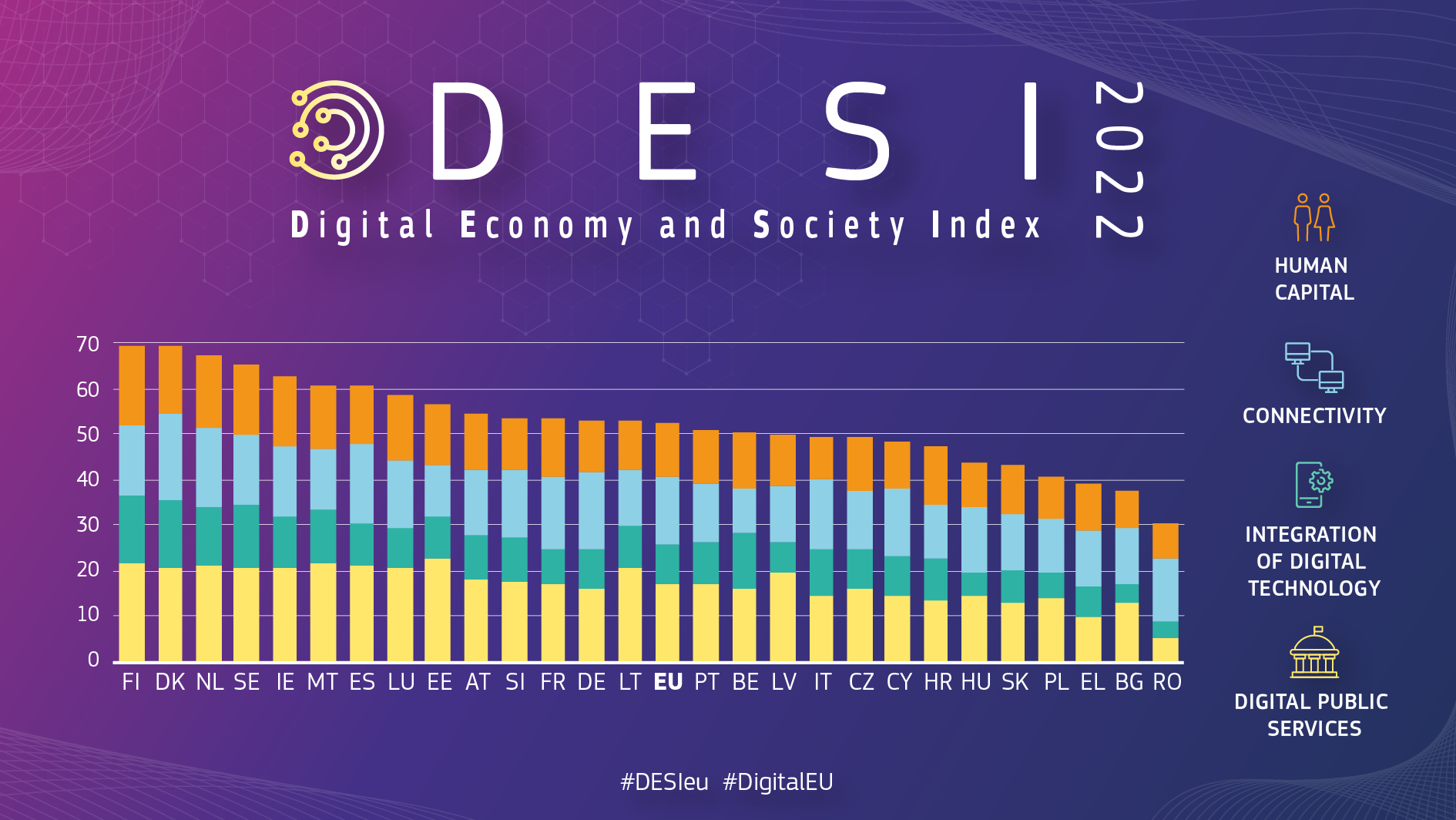
23.11.22
Building the DESI Ecosystem In Ukraine
Digitalisation of government services, business, and access to technology open many opportunities. Thus, understanding the state’s progress in this area and improving the digital experience of citizens is of the greatest importance. DESI (Digital Economy and Society Index), which Ukraine plans to introduce, helps EU countries in this area.
On November 16, the EU4DigitalUA project together with the Technical Assistance and Information Exchange Mission (TAIEX) of the European Commission held a workshop on creating the prerequisites for the implementation of DESI in Ukraine. It was attended by the Ministry of Digital Transformation, the State Statistics Service, the National Commission for the State Regulation of Electronic Communications, Radiofrequency Spectrum and the Provision of Postal Services, and the Ministry of Economy of Ukraine, as well as foreign experts from various departments of the EU countries.
Experts from Finland and Estonia provided advice on the legal and institutional framework, including coordination between public authorities, and shared their experience on practical issues arising during the implementation of the index. A significant part of the workshop was devoted to the collection of data for the index and its update, public access to data, and calculation of indicators. At the end, there were discussions and a round table as to the recommendations for implementing the index in Ukraine.
The EU4DigitalUA project supports the implementation of DESI in Ukraine. Experts analyse the legal and political framework for the collection of digital data and help create the prerequisites for the application of DESI in Ukraine.
What is DESI?
The Digital Economy and Society Index (DESI) is a composite index that measures and compares the progress of EU countries in the field of digital economy and society. Since 2014, the European Commission has been monitoring the progress of EU member states in digital competitiveness and measuring the digital performance of Europe as a whole with the help of DESI.
DESI itself is a measurement and monitoring tool. It draws on a larger ecosystem, including relevant legislation, inter-agency coordination, methodology, and data. Collectively, all this forms the digital economy and is called the “DESI ecosystem”.
DESI in Ukraine is a prerequisite for EU integration
According to the Association Agreement between Ukraine and the EU, signed in 2014, the government of Ukraine undertook to bring its legislation in line with the EU standards. Ukraine has serious prerequisites for joining DESI. The Concept and Action Plan for the development of the digital economy and society of Ukraine have been legally adopted. However, there is a need of more modern digital strategy, aligned with the latest EU strategies.
By establishing a coherent legal, political, institutional coordination and methodological framework for DESI, the Ukrainian government will be able to not only measure and track but also shape digital transformation policy based on data.
Last year, a working group was created, which included representatives of key state bodies working on the inclusion of Ukraine into DESI. As a part of the working group activities, with the support of EU4DigitalUA experts, a report and other analytical materials were prepared, which assess the current state and determine the necessary steps for the inclusion of Ukraine in DESI. A draft resolution of the Cabinet of Ministers was also developed, which aims to provide the ground for the DESI ecosystem creation in Ukraine. The project and key ministries continue their work to create the prerequisites for the implementation of DESI in Ukraine for further integration into the EU digital market.
The implementation of DESI in Ukraine will enable to determine the dynamics and progress of digital development, comparing with the digital economies of the EU, and thus, contribute to the integration into the Single Digital Market of the EU.
Similar news
EU-supported Trembita system benefits the development of digital government in Ukraine
The high-level online conference "Trembita system: How we made data run, not people" was held on 11 March 2021. It presented the importance of the EU-supported Trembita system...
EU4DigitalUA Organises Second Internship on Personal Data Protection
Video surveillance, drones, and biometric technologies are the reality of today's world. With the rapid development of technology, personal data protection extends far beyond traditional...


